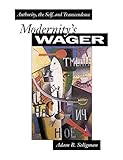Modernity's Wager : Authority, the Self, and Transcendence / Adam B. Seligman.
Material type: TextPublisher: Princeton, NJ : Princeton University Press, [2009]Copyright date: ©2000Edition: Course BookDescription: 1 online resourceContent type:
TextPublisher: Princeton, NJ : Princeton University Press, [2009]Copyright date: ©2000Edition: Course BookDescription: 1 online resourceContent type: - 9780691116365
- 9781400824694
- 303.3/6
- HM1251 .S45 2003
- online - DeGruyter
- Issued also in print.
| Item type | Current library | Call number | URL | Status | Notes | Barcode | |
|---|---|---|---|---|---|---|---|
 eBook
eBook
|
Biblioteca "Angelicum" Pont. Univ. S.Tommaso d'Aquino Nuvola online | online - DeGruyter (Browse shelf(Opens below)) | Online access | Not for loan (Accesso limitato) | Accesso per gli utenti autorizzati / Access for authorized users | (dgr)9781400824694 |
Browsing Biblioteca "Angelicum" Pont. Univ. S.Tommaso d'Aquino shelves, Shelving location: Nuvola online Close shelf browser (Hides shelf browser)

|

|

|

|

|

|

|
||
| online - DeGruyter The World of Prometheus : The Politics of Punishing in Democratic Athens / | online - DeGruyter The Athenian Nation / | online - DeGruyter Academic Instincts / | online - DeGruyter Modernity's Wager : Authority, the Self, and Transcendence / | online - DeGruyter Slaves, Masters, and the Art of Authority in Plautine Comedy / | online - DeGruyter Unfree Speech : The Folly of Campaign Finance Reform / | online - DeGruyter Goodness and Advice / |
Frontmatter -- Preface and Acknowledgments -- Introduction -- CHAPTER ONE. The Self in the Social Sciences -- CHAPTER TWO. Authority and the Self -- CHAPTER THREE. Heteronomy and Responsibility -- CHAPTER FOUR. The Self Internalized -- CHAPTER FIVE. Tolerance and Tradition -- NOTES -- BIBLIOGRAPHY -- INDEX
restricted access online access with authorization star
http://purl.org/coar/access_right/c_16ec
Adam Seligman, one of our most important social thinkers, continues the incisive critique of modernity he began in his previously acclaimed The Idea of Civil Society and The Problem of Trust. In this provocative new work of social philosophy, Seligman evaluates modernity's wager, namely, the gambit to liberate the modern individual from external social and religious norms by supplanting them with the rational self as its own moral authority. Yet far from ensuring the freedom of the individual, Seligman argues, "the fundamentalist doctrine of enlightened reason has called into being its own nemesis" in the forms of ethnic, racial, and identity politics. Seligman counters that the modern human must recover a notion of authority that is essentially transcendent, but which extends tolerance to those of other--or no--faiths. Through its denial of an authority rooted in an experience of transcendence, modernity fails to account for individual and collective moral action. First, deprived of a sacred source of the self, depictions of moral action are reduced to motives of self interest. Second, dismissing the sacred leaves the resurgence of religious movements unexplained. In this rigorous and imaginative study, Seligman seeks to discover a durable source of moral authority in a liberalized world. His study of shame, pride, collective guilt, and collective responsibility demonstrates the mutual relationship between individual responsibility and communal authority. Furthermore, Seligman restores the indispensable role of religious traditions--as well as the features of those traditions that enhance, rather than denigrate, tolerance. Sociologists, political theorists, moral philosophers, and intellectual historians will find Seligman's thesis enlightening, as will anyone concerned with the ethical and religious foundations of a tolerant society.
Issued also in print.
Mode of access: Internet via World Wide Web.
In English.
Description based on online resource; title from PDF title page (publisher's Web site, viewed 08. Jul 2019)


